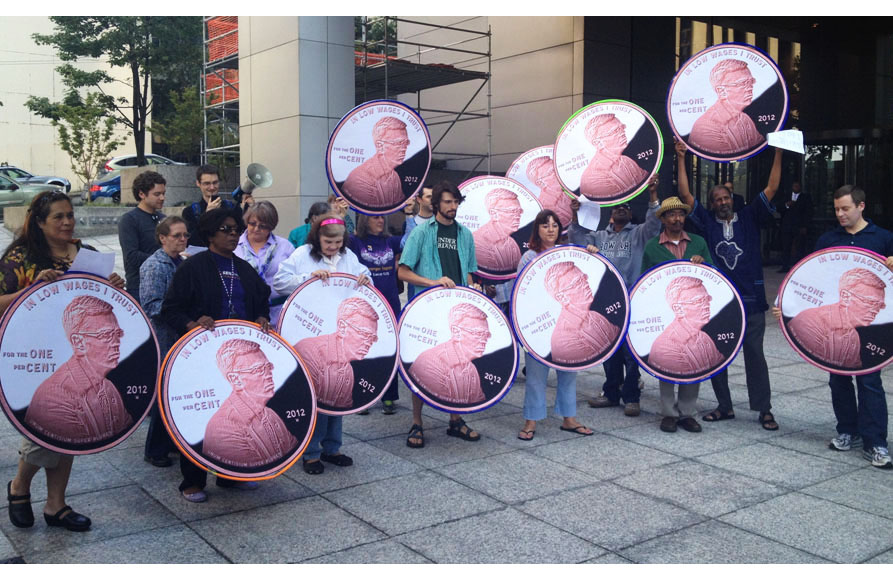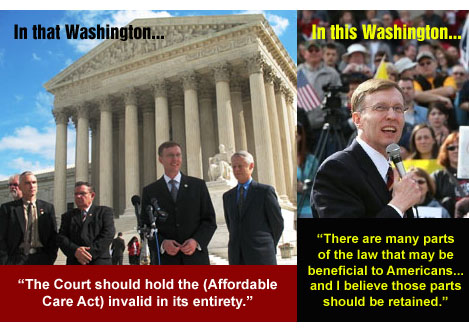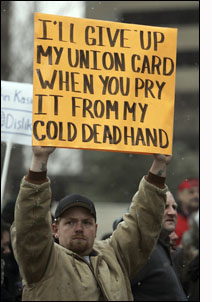OPINION
Dear Mr. McKenna: Some unsolicited advice…
 By DAVID GROVES
By DAVID GROVES
Editor of The Stand
Dear Mr. McKenna,
Over the weekend, The Seattle Times — a newspaper that not only endorsed you but blurred journalistic ethics by actively contributing free ads to the Rob McKenna for Governor campaign — offered your opponent, Democratic Gov.-elect Jay Inslee, some advice on how to run things as leader of Washington state. It is in this same spirit of reaching across political lines and helping each other that The Stand offers you and your Republican Party some advice on how you could break your three decade (and counting) streak of gubernatorial failure.
1. Don’t advocate for people to make less money at work. This may seem like political common sense, but you and your party continually do this. Whether it’s opposition to prevailing wage standards on public-works projects, opposition to unionization that enables people to bargain for higher wages, support of trade agreements and tax policies that promote the outsourcing of family-wage American jobs to low-wage countries, or in your case, undermining the minimum wage law, Republicans seem tone-deaf to the concept that most of the people whose votes you seek are working class.
Middle- and working-class people have watched their wages stagnate for decades, and then drop in recent years. In 1988, the income of an average American taxpayer was $33,400, adjusted for inflation. Twenty years later in 2008, the average income was still just $33,000, according to IRS data. Then the recession hit. Since 2008, persistently high unemployment has allowed employers to demand more work for less pay from those Americans still fortunate enough to have jobs. Wages have taken a sharp and swift fall to an extent not seen since the Great Depression.
 While things are slowly starting to get better nationally and in Washington state, 2012 proved to be a particularly bad time for candidates who have advocated for lower wages. It was just a bad call for a guy who knew he was running for governor to use the power of his Attorney General’s office to try to reinterpret our state’s popular indexed minimum wage law to prevent a 12-cent increase in the state’s lowest legal wage. You compounded that mistake when you let it slip — at a January 2011 Battle Ground Chamber of Commerce meeting — that you support the concept of a sub-minimum training wage.
While things are slowly starting to get better nationally and in Washington state, 2012 proved to be a particularly bad time for candidates who have advocated for lower wages. It was just a bad call for a guy who knew he was running for governor to use the power of his Attorney General’s office to try to reinterpret our state’s popular indexed minimum wage law to prevent a 12-cent increase in the state’s lowest legal wage. You compounded that mistake when you let it slip — at a January 2011 Battle Ground Chamber of Commerce meeting — that you support the concept of a sub-minimum training wage.
There is a reason why this minimum wage issue dogged you in TV and radio ads throughout your 2012 campaign. Internal polling of Washington voters — unionized or not — showed that it was one of the most compelling arguments against your candidacy. But you already knew that, which is why you rarely mentioned it or attempted to defend it. You knew it would merely give the issue more attention.
You might want to share this knowledge with the GOP friends you leave behind in Olympia. At business lobbying groups’ behest, they appear to be laying the groundwork for yet another attempt at undermining our state minimum wage law in 2013. When they try again, just as surely as they will fail, they will be writing their future opponents’ campaign materials.
2. Signing onto the lawsuit to repeal federal health care reform was a big mistake. If you look at the list of the 26 AGs who joined you in this failed effort, the vast majority were from solidly conservative red states. There were several from presidential “swing states,” including Florida, Virginia, Michigan, Colorado, Pennsylvania, Wisconsin and Ohio. (All of those states, by the way, ended up voting to re-elect President Obama.) But there was only one AG from a solidly blue state who stuck his neck out to try to repeal federal health care reform in its entirety. That was you.
 Your attempts to equivocate and claim you supported some popular elements of the law, despite signing onto a lawsuit that sought complete repeal, fell flat. And once the suit was rejected by the U.S. Supreme Court, it became a subject your campaign actively avoided. As with the minimum wage, I’m sure your pollsters made it clear that coverage of pre-existing medical conditions, being able to include young adults on parents’ policies and closing the Medicare “donut hole” in prescription drug coverage remain quite popular.
Your attempts to equivocate and claim you supported some popular elements of the law, despite signing onto a lawsuit that sought complete repeal, fell flat. And once the suit was rejected by the U.S. Supreme Court, it became a subject your campaign actively avoided. As with the minimum wage, I’m sure your pollsters made it clear that coverage of pre-existing medical conditions, being able to include young adults on parents’ policies and closing the Medicare “donut hole” in prescription drug coverage remain quite popular.
So while the rest of our state government was leading the way in implementing this effort to expand health coverage to millions more of its residents, you led the charge to repeal it. It belied your meticulously constructed image of a “moderate” Republican in a blue state.
What impact did your role in this lawsuit have on your failed election? It’s hard to say without detailed exit polling in hand, but I will say this: it was an absolute “magic bullet” in many of my conversations with fellow commuters on the Bainbridge Island ferry. This predominantly middle- to upper-class group of educated professionals should have been your peeps. And many were. But when I talked to people who were undecided about whether they should support you or Jay Inslee, it was the health care lawsuit that sealed the deal against you. Many of them really wanted to support a Republican “for a change” in Olympia. But this issue resonated like no other among this group of well-informed potential “swing voters.”
Swing, and a miss.
3. Don’t threaten unions and collective bargaining rights. This might be the hardest one of all for your party to swallow. I know how much you hate unions. You hate them because they usually oppose you politically. You hate them because the corporations and business executives who finance your efforts hate them. You hate them because the Ayn Randy free-market ideologues in your ranks hate them. But hear me out.
 Washington state is one of the most unionized states in the country. Nearly one in five of us are members of unions, which ranks Washington 4th in the nation in union density. I know you recognize this to be an important voting bloc because you weren’t as aggressively anti-union with your rhetoric as many other Republicans.
Washington state is one of the most unionized states in the country. Nearly one in five of us are members of unions, which ranks Washington 4th in the nation in union density. I know you recognize this to be an important voting bloc because you weren’t as aggressively anti-union with your rhetoric as many other Republicans.
You attempted to walk a fine line on collective bargaining in your campaign, and it didn’t work. You wanted to show your party faithful and national Republicans that you were with their program on blaming public employees’ too-generous wages and benefits for state budget woes and you vowed to “change” the state’s collective bargaining laws. But at the same time, you tried to express your support for collective bargaining in theory and to distance yourself from notorious anti-union governors like Wisconsin’s Scott Walker.
As with your stance on the health care lawsuit, you dodged, ducked, dipped, dived and… dodged on collective bargaining. But in the end, your base outed you and made it easy for unions to make the case that you wanted to take away their ability to advocate for higher wages and better working conditions. I know you’d respond that you wouldn’t have done that, but this may be one of those cases where your party’s newly aggressive anti-union national agenda hurt you because you unsuccessfully tried to tap-dance in and out of support for it.
Once again, there was a reason why every piece of election literature that unions put out to their members criticized you on this issue. Internal polling of union members showed that they hated the idea of government officials messing with their bargaining rights. As the Associated Press pointed out, after two years of getting pummeled by attacks on their bargaining rights in Wisconsin, Indiana and other battleground states, union members retaliated against Republicans last Tuesday:
Labor’s massive voter turnout effort played a major role in helping President Obama win Ohio, Nevada and Wisconsin, according to exit polls, and its leaders are now looking for a more liberal, pro-union agenda from the White House.
Look, don’t take it personally. The national Republican Party says it’s also doing some soul-searching about their 2012 failures.
All I’m saying is, you and your party should reassess your policies that undermine people’s ability to get some decent pay, health care coverage and a union if they want one — especially in solid-blue, pro-union Washington state. People work hard, in both the public and private sectors, but they’ve watched their wages erode, their health benefits cut and their prospects for retirement wither away. Meanwhile, big corporations and the top 1% seem to be doing just fine.
They don’t want to punish businesses and individuals that are successful, they just want what’s fair for themselves and their families. They want the same standard of living their parents and grandparents enjoyed, and the opportunity to do even better. Right now, they’re not getting that. And along comes another politician that tells them they need to be more “competitive” and give up even more or risk losing their jobs overseas.
It’s just not a recipe for getting elected.
P.S. I fully understand that policies creating downward pressure on wages are what pleases the aforementioned big corporate interests and trickle-down 1%-ers, and they’re the ones who support your campaigns financially. That’s your problem, not mine.
Sincerely,
David Groves is Editor of The Stand. Contact him at david.groves@thestand.org.





